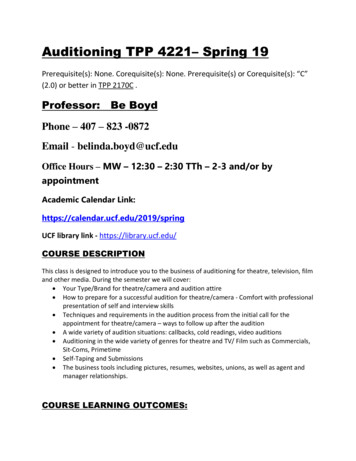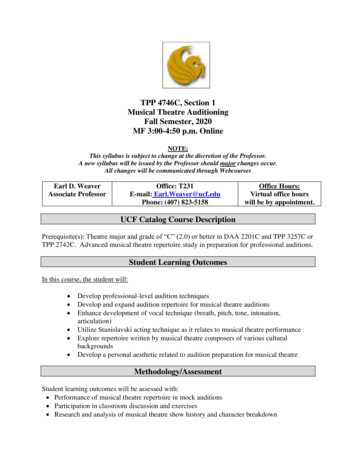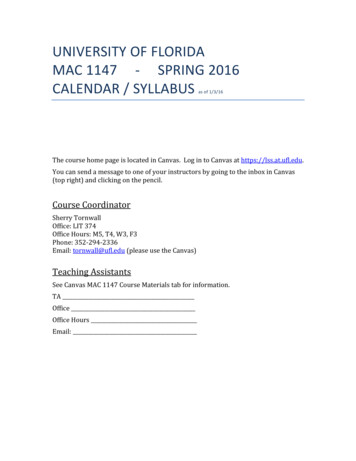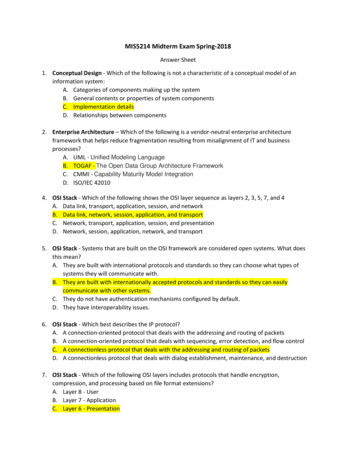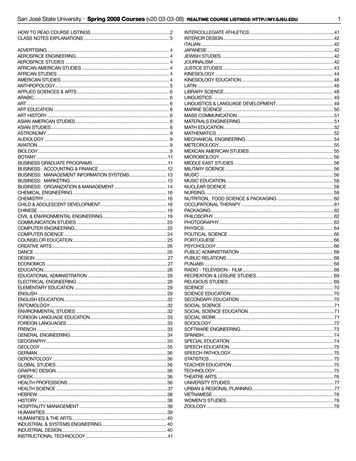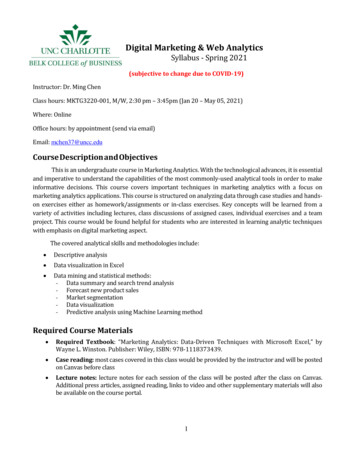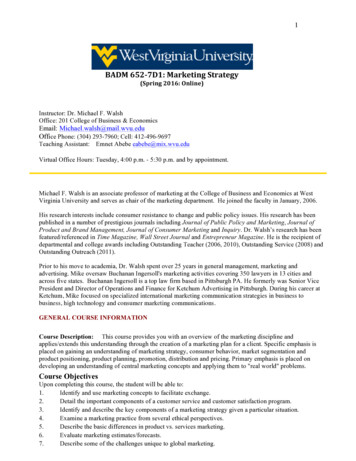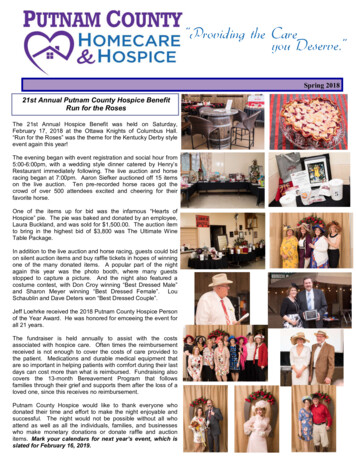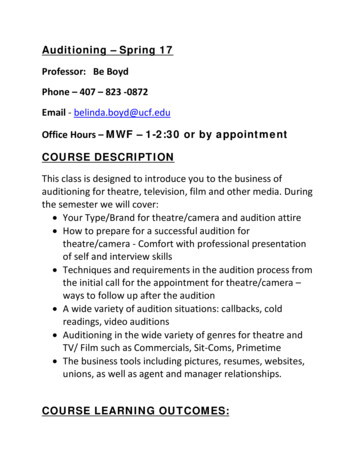
Transcription
Auditioning – Spring 17Professor: Be BoydPhone – 407 – 823 -0872Email - belinda.boyd@ucf.eduOffice Hours – MWF – 1-2:30 or by appointmentCOURSE DESCRIPTIONThis class is designed to introduce you to the business ofauditioning for theatre, television, film and other media. Duringthe semester we will cover: Your Type/Brand for theatre/camera and audition attire How to prepare for a successful audition fortheatre/camera - Comfort with professional presentationof self and interview skills Techniques and requirements in the audition process fromthe initial call for the appointment for theatre/camera –ways to follow up after the audition A wide variety of audition situations: callbacks, coldreadings, video auditions Auditioning in the wide variety of genres for theatre andTV/ Film such as Commercials, Sit-Coms, Primetime The business tools including pictures, resumes, websites,unions, as well as agent and manager relationships.COURSE LEARNING OUTCOMES:
The student will demonstrate confidence, professionalismand a strong audition package in the audition/interviewprocess. The student will demonstrate an understanding of theircharacter type/brand for the industry The student will demonstrate an understanding ofappropriate audition attire for their character type/brandand/or for the audition venue. The student will create a basic website The student will demonstrate a basic understanding ofauditioning for commercial work. The student will demonstrate a basic understanding ofauditioning for television and film. The student will acquire and provide an INDUSTRYSTANDARD headshot and resumeInstruction / Content
Since the business is often tough and unapologetic – you willreceive comments on your work from that perspective. Yourlook, professional demeanor, non-verbal energy andcommunications skills are as important in this business as yourtalent- at times you will receive comments about adjusting yourlook sharpening your professional demeanor andcommunication skills and developing an awareness of your nonverbal energy -purely for the purpose of making you moremarketable. This class is not about process, but about product.The pace will be fast to mirror the expectations of the business.Your work will be viewed from that perspective. Receive thecomments with professionalism and maturity. Do not takethem personally.Course Requirements You must dress in professional/ audition attire each day ofthe class. When given audition material, you are expectedto be prepared and polished on the audition day.MAJOR ASSIGNMENTS*Syllabus may change to accommodate the needs of the class. Mock Auditions – You will have a series of mock auditions.The first audition will occur on the first day of class. Thepurpose of this exercise is to access your currentauditioning skills. During the semester you will audition
for each area covered -Theatre (sides and cold readings),Sides for Commercials, TV and Film Roles. 200pts each –*Note – for the mock auditions for each area, you will begraded on your audition attire and tools, auditionetiquette as well as your performance for the audition. Industry Type/Brando Your type is a combination of the five criteria foundon any breakdown when a role is being cast: sex, agerange, physicality (race, gender, ethnicity, short, tall,thin, stocky, heavy, athletic), job title or role in life (i.eyoung or older parent, teen, grandparent, lawyer,intern, action hero, active type, cop, federal orundercover agent, medical staff, student, criminal,corporate, blue collar, etc), personality trait (quirky,serious, intellectual, sexy, loud, innocent, bouncy,moody, depressed, mysterious, dangerous, anxious).o Your brand is simply taking those qualities and addingsomething very uniquely YOU to the mix. That qualitybecomes your brand. It might help you to get castmore frequently.o The type/brand tells the public what kind of actor theywill see in a role. If it’s Morgan Freeman, you knowyou are going to see an authoritative, groundedenergy, Sandra Bullock, you know that she’ll be toughand charming. Watching Robert De Niro, you knowthe performance will be intense even now in hiscomedic work. With Meryl Streep you can expect a
performance with close to perfect dialect andemotional depth. With Melissa McCarthy you will getboisterous, over the top comedy. Judi Dench isconsistently graceful and dignified. Kevin Hart iscowardly, silly but in the end lovable.o Defining your type/brand does not mean pigeonholing yourself or that your skills are limited toplaying only this type. What is does mean is that as anactor you have awareness of how you might or can beseen by the industry and you can deliver that in aperformance. It gives them something specific. Yourbrand doesn’t limit you – it gets your foot in the door.On, Jan 17 you will bring in at least 3 pictures of famousactors whose category or type you can realistically fit into.(Find pictures that are big enough for us to see thefeatures of the actors you choose). Look to actors youresemble (Brad Pitt was compared to a young RobertRedford when he first started) or actors whose energy issimilar to yours (is your natural energy edgy and sexy likeViola Davis, intense like Christian Bale, sensual likeAngelina Jolie, naturally nerdy like Jesse Eisenberg, peppylike Anna Faris, the clown like Kevin Hart, artsy like JillScott, or quietly confident/trustworthy like Tom Hanks?(See websites and articles about type near the end ofsyllabus). Once you have done this, we will begin to talkabout a look that helps you achieve the look that movesyou more toward your marketable or commercial type forthe industry. You will receive feedback on your audition
attire the first day of class. Dress parades will beincorporated into the mock auditions for you todemonstrate your understanding of your type and theaudition attire for that particular audition venue.You will receive an overall grade for your Audition Attireand Physical Achievement toward type (including thematerial you choose for auditions) for the semesterworth 300pts. Website –300pts. You will build a website to increase yourmedia presence. Due April 11 – email the websiteaddress by 5pm. There are a number of free websitebuilder starter programs out there, the majority are onesthat require a fee to maintain after the initial presence.Wix, Solutions, Mixform, others listed below. Your websiteshould include photos, resume, bio, clips, and possibly ablog. On your blog, you can talk about your life, what youlove, what inspires you, etc. All of your postings shouldrelate to the business in some way. You will be giving youragent/prospective agent the tools they need to representyou properly so they do! Here are some samples ofwebsites from former students: Courtney Grile http://www.courtneyhelengrile.com/ , Nick Saldivar http://nick-saldivar.com/ , Terrance Jackson http://www.terrance-jackson.com/about/ Inge Uys http://ingeuys.com/acting/resume/, Salavatore Vieria http://www.salvatorevieira.com/#!gallery/c1zy6, QuentinDarrington - http://quentindarrington.wix.com/qed#!
Headshots/Resumes – 300pts. You must have a quality,industry standard headshot and a resume. You will alsoneed to secure a professional photographer and schedulea headshot session. Please bring in your current headshotand resume for the first mock audition. On Jan 31 pleaseemail your appointment time and photographer’s info foryour head shot session. The first draft of your resume andthe website for your headshots is due on March 2. Youshould email resume and upload pictures from yourwebsite to email. The final copy of your Headshot andResume due on the last day of class. Assignments are lateif they are not received by 5pm on due date. Showcase Audition – 300pts. On Finals Day, we will haveinvited agent/s to see your final audition. On March 30 orApril 4, we will begin in class work on your showcaseaudition – your pieces should be chosen before this date.When we begin in class work on your showcase pieces,you will dress for the appropriate audition and present theappropriate audition piece/s. You will also bring your finalhead shot/s and resume to the Showcase. Showcase andFinal - .*Please note that this date or time might need tochange in order to accommodate the agent/s schedule.)*There are useful websites and articles at theend of your syllabus
DAILY SCHEDULE*For due dates for Major Assignments -Please refer to theMajor Assignment SectionJan 10 /12 Syllabus/Tues and Thurs - Mock Audition andFeedback - Reading:Jan 17/19 Tues Bring in pictures of your type/ How toApproach Cold Readings for Theatre –Overview – Thur BeginCold ReadingsJan 24/26Cold Readings for Theatre – You and a ReaderJan 31/ Feb 2 appointment time and photographer’s info foryour head shot session.Feb 7/9ACTF - outside class assignments – prepcommercial auditions, work on websiteFeb 14 -/16Feb 21/23Commercial AuditionsFinish Commercial Auditions/ InterviewsFeb 28/Mar 2Interviews/ Discuss Voice Over/ The firstdraft of your resume and the website for your headshots isdueMar 7 - 9Mar 14/16Spring Break – Yippppeee!!!Auditioning for TV and Film
Mar 21/23TV and Film AuditionsMar 28/ 30 Mock Auditions for Camera – if time - BeginWork on Showcase AuditionApril 4/6Begin Work on Showcase AuditionApril 11/ 13Work on ShowcaseApril 18/20Work on ShowcaseFinal - Showcase With AgentsClassroom Conduct Students must follow the University standards for personaland academic conduct as outlined in The Golden Rule. Students are apprised when they are accepted at theUniversity that they must be aware of and follow these policiesof conduct. See http://ucf.edu/goldenrule/ for details. All cell phones, I pods must be turned off at the beginning ofclass time Guest will not be permitted in class with prior consent of theinstructor.Attendance
Acting training is a progressive process. Do not miss class.Every class is a valuable step toward altering your process. Punctual attendance in class - as for rehearsal calls - ismandatory – You will be given a daily attendance and participation gradethat will average into your final grade. If you do miss class, you must make up the work assigned forthe day you missed and you must be prepared to participatefully in class exercises or performances upon the day of yourreturn. If you are absent during a group performance or presentation,you will not be allowed to make up this assignment. In thiscase, the other members of the group will be given anamended list of guidelines for completing the project withoutyou.GradingAll work will be based on a 100pt grading scale. Your finalgrade for the course will be based on the accumulation ofpoints for the following areas: Major Assignments (see weekly schedule) Participation on daily assignments and exercises
Assignment deadlines and punctuality Willingness and Consistency when rehearsing with partnersoutside of the scheduled class time Professionalism (including attitude toward criticism, andrespect for fellow classmates Demonstration a clear understanding of the work covered inclass – demonstration of application of the feedback given Your first unexcused absence will lower your final grade fivepoints, your second unexcused absence will lower your grade10 points (which will lower it a full letter), and your thirdunexcused absence will result in a failure of the course. Missingclass for participating in a show is not a valid excuse.Useful Websites and ArticlesBackstage – Where to Begin Your Acting here-begin-your-acting-career/Site with good tips from a Casting s-from-a-casting-directorBackstage ArticleCasting directors are your advocates and your champions. Your work reflects on us. Yourwonderful work makes us look good and gets that role cast. Your disconnected, tentative,muddled work does nothing for anyone. We need you to be great. We’re here to host yourexperience and shepherd you in, not hold you back. We want to share in your excellent work.
Casting directors await you on the other side of that door – the door that you can see as agateway or a barricade. While you turn it into a horror movie, it’s your stage, not a torturechamber. Whether it’s a pre-read for an associate or a full-blown director/producer callbacksession, this is your time, your experience. This is your opportunity to do exceptional work.Enter the space and do the work for yourself, for the gratification of the work itself, and yes, tocollaborate with the other creative people waiting to figure it out with you. They can’t do itwithout you.Here are some choices (and they are choices) to make any casting director truly happy in theroom.1. Accept the invitation with grace and enthusiasm. You were requested to be here as ourguest.2. Come to work and not to please or get our approval.3. Enter with certainty. Don’t give up your power as soon as the door opens.4. Play on a level playing field. We’re all figuring it out. Together.5. Make no excuses whatsoever. Leave your baggage outside. Better yet, at home.6. Make the room your own. It will make us so much more comfortable.7. Ask questions only when you truly need answers. “Do you have any questions?” is usuallyanother way of saying: “Are you ready?” You aren’t required to have one.8. Know your words and understand what you’re talking about. You don’t have to be totally offbook, but if you’ve spent quality time with the material, you’re going to know it.9. Do your homework on the project. This includes knowing all the players and the show orfilm’s tone and style. Read all the material you can get your hands on.10. Make choices and take responsibility for the choices you make.11. Don’t apologize. Ever. For anything.12. Know what you want to do and do it. Then leave yourself available to make discoveries.Know that your homework is done. Now let your preparation meet the moments.13. Don’t mime or busy yourself with props, (unless specifically needed). Keep it simple.14. Don’t expect to be directed, but if you are, take the direction, no matter what it is.Understand how to translate results-oriented direction into action.
15. Don’t blame the reader. Make the reader the star of your audition. According to myteaching partner Steve Braun, you should engage fully no matter who’s reading those lines.Likely your reader will engage – at least somewhat – if you show up.16. Make specific, personal, bold choices. We want your unique voice to bring the script to life.17. Stillness is powerful for the camera. Understand how to move and work in front of thecamera – eliminate running in and out and getting up and down.18. Require no stroking, coddling, or love. We’re there to work. Don’t take it personally whenwe’re not touchy-feely. Know that we love actors and that’s truly why we’re here.19. Understand that you’re there to collaborate. You’re being evaluated in terms of how youserve the role and the material. It's not a verdict on your personhood. Judgment is somethingyou can control.20. What you bring in reflects how you’re received so bring in joy, conviction, and ease, and ourhearts will open.21. Share your artistry above all else.Remember that we’re all human in those rooms, and you can affect us on an emotional level.It’s what we all really want. That’s your job. You being fully present, truthful, personal, andvulnerable is going to give us the ammunition we need to champion you with all our hearts. Weall desperately want you to do great work. We’re rooting for that every time you walk into theroom. You show up and do your fullest, deepest work, and we’ll slay dragons for you and followyou anywhere. And man, we’ll be so happy doing it. You have the power to make that happen.For you. For us. For the work. Hallelujah!Risa Bramon Garcia runs a Studio for Actors in L.A. with partner, Steve Braun, The BGB Studio Bramon Garcia Braun (link), dedicated to actors’ whole journey, connecting craft with career.New summer classes and workshops are starting in June. http://bramongarciabraun.com/Joe Mantello spoke about auditions during my September 30th, 2004 interview with himbackstage at the Gershwin Theatre in New York City. The award-winning director helmed the hitmusical Broadway Wicked, the Assassins revival, and many other shows.Common MistakesCarol de Giere: What's the biggest mistake people make during auditions?Joe Mantello: I think the biggest mistake people make in the room is not being relaxed. WhatI've learned being a director, which I didn't know as an actor, is generally a person walks into
the room, and they're in the zone of what we're looking for or not. And quite often the bestperson doesn't get the part.I always tell every young actor that I know, try to be a reader. Come in and watch auditions,because when you're on the other side of it, you see fantastic actors come in and not get thepart because they're two years too old, or they're too tall, or any number of reasons. I alwaysencourage people to come in with the attitude of: This is what I would do if I played the role.This is what I bring to the table. I hope you like it. If you don't, see you next time.Too often I see actors trying to second guess what the team or the writer or the director arelooking for, and so they are not really in their skin, they are projecting something else. Theyneed to walk in and go, “Hello, how are you?” And win confidence sort of saying this is my takeon the role at this point, do you have any adjustments? And sometimes if I see a person is greatand they're going off in another direction, I'll give them an adjustment and see if they take it.Often I want someone who comes into a room who I want to be around for a year or, you knowwhat I mean? It's all those kinds of things.Here's the thing that bugs me sometimes, and I was guilty of it myself as an actor. When anactor leaves, and they come back or have the agent call and go, they really felt they didn't do agood job and they want to come back. I would say 9 times out of 10 it's a waste of everybody'stime. Because sometimes the reason you're not being called back has nothing to do with youraudition. Your audition could have been perfectly fine. You just might not be what we'relooking for.We live in New York City. If I'm looking for a 12-year-old Hispanic kid with braces, and ya da yada ya da, someone's going to come in. I think sometimes as actors we're taught you should beable to do anything. You should be able to be a chameleon and be able to embody anything.And sometimes it's just, no, the real thing is going to walk into the door. Do you know what I'msaying?CD: Totally. Not to take it personally.JM: Don't take it personally. Come in, say hello, do your thing, walk out, and whatever happens,happens.ReadersCD: So people can come to be a reader? What does that mean? Can you come to auditions andwatch?
JM: No. But usually what happens is that there is usually an actor in the room that reads. So ifsomeone is going to come in and read for Fiyero, right? They're going to come in to do the lioncub scene, so the actress playing Elphaba is not going to be there, so an actor is hired. All theteam is sitting behind the table. Hello, hello, hello, nice to meet you. So now I'm going to read.There's usually a person sitting to the side who will play the scene with them, that's hired to dothat.CD: What a great idea. How do you get those jobs?JM: You have to ask, you have to know a casting director. It's a very hard thing though. BecauseI think to be a good reader at an audition can make all the difference. Because you've got to doenough to give the person who is auditioning something to work with and yet it's not youraudition. So you have to hold back a little bit. You have to stay on top of it. You know what Imean? You have to really be there.I've seen amazing readers at auditions and I've seen people and I've sai
belinda.boyd@ucf.edu . Office Hours – MWF – 1-2:30 or by appointment. COURSE DESCRIPTION . This class is designed to introduce you to the business of auditioning for theatre, television, film and other media. During the semester we will cover: Your Type/Bran
